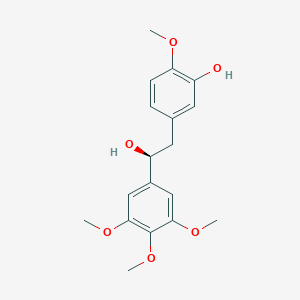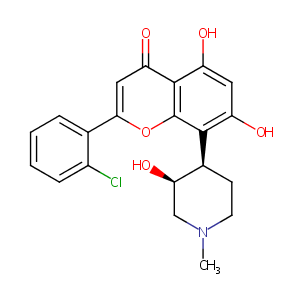| 1 |
Recurrent recessive mutation in deoxyguanosine kinase causes idiopathic noncirrhotic portal hypertension.Hepatology. 2016 Jun;63(6):1977-86. doi: 10.1002/hep.28499. Epub 2016 Mar 31.
|
| 2 |
Clinical pipeline report, company report or official report of the Pharmaceutical Research and Manufacturers of America (PhRMA)
|
| 3 |
URL: http://www.guidetopharmacology.org Nucleic Acids Res. 2015 Oct 12. pii: gkv1037. The IUPHAR/BPS Guide to PHARMACOLOGY in 2016: towards curated quantitative interactions between 1300 protein targets and 6000 ligands. (Ligand id: 5680).
|
| 4 |
Phase 1 and pharmacokinetic study of bolus-infusion flavopiridol followed by cytosine arabinoside and mitoxantrone for acute leukemias. Blood. 2011 Mar 24;117(12):3302-10. doi: 10.1182/blood-2010-09-310862. Epub 2011 Jan 14.
|
| 5 |
Flavopiridol down-regulates antiapoptotic proteins and sensitizes human breast cancer cells to epothilone B-induced apoptosis. Cancer Res. 2003 Jan 1;63(1):93-9.
|
| 6 |
Clinical pipeline report, company report or official report of the Pharmaceutical Research and Manufacturers of America (PhRMA)
|
| 7 |
Pharma & Vaccines. Product Development Pipeline. April 29 2009.
|
| 8 |
The novel BCR-ABL and FLT3 inhibitor ponatinib is a potent inhibitor of the MDR-associated ATP-binding cassette transporter ABCG2. Mol Cancer Ther. 2012 Sep;11(9):2033-44.
|
| 9 |
Organic anion transporting polypeptide 1B1: a genetically polymorphic transporter of major importance for hepatic drug uptake. Pharmacol Rev. 2011 Mar;63(1):157-81.
|
| 10 |
Drug-drug interactions for UDP-glucuronosyltransferase substrates: a pharmacokinetic explanation for typically observed low exposure (AUCi/AUC) ratios. Drug Metab Dispos. 2004 Nov;32(11):1201-8.
|
| 11 |
The cyclin-dependent kinase inhibitor flavopiridol sensitizes human hepatocellular carcinoma cells to TRAIL-induced apoptosis. Int J Mol Med. 2006 Aug;18(2):249-56.
|
| 12 |
Flavopiridol induces cellular FLICE-inhibitory protein degradation by the proteasome and promotes TRAIL-induced early signaling and apoptosis in breast tumor cells. Cancer Res. 2006 Sep 1;66(17):8858-69. doi: 10.1158/0008-5472.CAN-06-0808.
|
| 13 |
Identification and Profiling of Environmental Chemicals That Inhibit the TGF/SMAD Signaling Pathway. Chem Res Toxicol. 2019 Dec 16;32(12):2433-2444. doi: 10.1021/acs.chemrestox.9b00228. Epub 2019 Nov 11.
|
| 14 |
Flavopiridol induces apoptosis in chronic lymphocytic leukemia cells via activation of caspase-3 without evidence of bcl-2 modulation or dependence on functional p53. Blood. 1998 Nov 15;92(10):3804-16.
|
| 15 |
Flavopiridol inhibits smooth muscle cell proliferation in vitro and neointimal formation In vivo after carotid injury in the rat. Circulation. 1999 Aug 10;100(6):659-65. doi: 10.1161/01.cir.100.6.659.
|
| 16 |
Loss of the Bcl-2 phosphorylation loop domain is required to protect human myeloid leukemia cells from flavopiridol-mediated mitochondrial damage and apoptosis. Cancer Biol Ther. 2002 Mar-Apr;1(2):136-44. doi: 10.4161/cbt.58.
|
| 17 |
Transcription inhibition by flavopiridol: mechanism of chronic lymphocytic leukemia cell death. Blood. 2005 Oct 1;106(7):2513-9. doi: 10.1182/blood-2005-04-1678. Epub 2005 Jun 21.
|
| 18 |
Flavopiridol targets c-KIT transcription and induces apoptosis in gastrointestinal stromal tumor cells. Cancer Res. 2006 Jun 1;66(11):5858-66. doi: 10.1158/0008-5472.CAN-05-2933.
|
| 19 |
Flavopiridol enhances human tumor cell radiosensitivity and prolongs expression of gammaH2AX foci. Mol Cancer Ther. 2004 Apr;3(4):409-16.
|
| 20 |
Abrogation of p21 expression by flavopiridol enhances depsipeptide-mediated apoptosis in malignant pleural mesothelioma cells. Clin Cancer Res. 2004 Mar 1;10(5):1813-25. doi: 10.1158/1078-0432.ccr-0901-3.
|
| 21 |
Bortezomib and flavopiridol interact synergistically to induce apoptosis in chronic myeloid leukemia cells resistant to imatinib mesylate through both Bcr/Abl-dependent and -independent mechanisms. Blood. 2004 Jul 15;104(2):509-18. doi: 10.1182/blood-2003-12-4121. Epub 2004 Mar 23.
|
| 22 |
Flavopiridol mediates cell cycle arrest and apoptosis in esophageal cancer cells. Clin Cancer Res. 1998 Nov;4(11):2885-90.
|
| 23 |
Flavopiridol induces apoptosis and caspase-3 activation of a newly characterized Burkitt's lymphoma cell line containing mutant p53 genes. Blood Cells Mol Dis. 2001 May-Jun;27(3):610-24. doi: 10.1006/bcmd.2001.0428.
|
| 24 |
Flavopiridol induces cell cycle arrest and p53-independent apoptosis in non-small cell lung cancer cell lines. Clin Cancer Res. 1999 Oct;5(10):2925-38.
|
| 25 |
The cyclin-dependent kinase inhibitor flavopiridol induces apoptosis in human leukemia cells (U937) through the mitochondrial rather than the receptor-mediated pathway. Cell Death Differ. 2001 Jul;8(7):715-24. doi: 10.1038/sj.cdd.4400868.
|
| 26 |
Flavopiridol induces apoptosis in glioma cell lines independent of retinoblastoma and p53 tumor suppressor pathway alterations by a caspase-independent pathway. Mol Cancer Ther. 2003 Feb;2(2):139-50.
|
| 27 |
Bcl-2 independence of flavopiridol-induced apoptosis. Mitochondrial depolarization in the absence of cytochrome c release. J Biol Chem. 2000 Oct 13;275(41):32089-97. doi: 10.1074/jbc.M005267200.
|
| 28 |
The cyclin-dependent kinase (CDK) inhibitor flavopiridol inhibits glycogen phosphorylase. Arch Biochem Biophys. 2001 Feb 15;386(2):179-87. doi: 10.1006/abbi.2000.2220.
|
|
|
|
|
|
|


